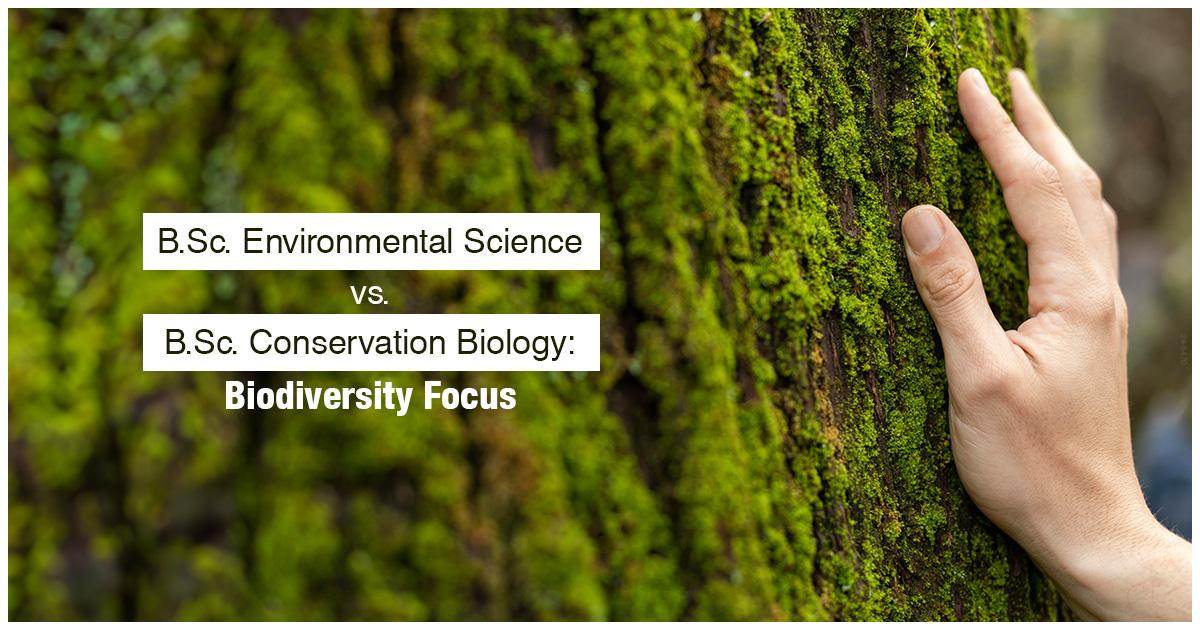Blog Detail


B.Sc. Environmental Science vs. B.Sc. Conservation Biology: Biodiversity Focus
27-09-2024

B.Sc. Environmental Science and B.Sc. Conservation Biology are distinct yet interconnected field within the realm of environmental studies. B.Sc. Environmental Science provides a broader understanding of environmental issues and is suitable for those interested in various roles across different sectors including environmental management, sustainable development, and policy implementation. B.Sc. Conservation biology focuses on biology and conservation and is ideal for individuals passionate about wildlife preservation and habitat management.
Both degrees play vital roles in addressing environmental challenges, and the decision usually aligns with one's specific passions and aspirations within the field of environmental studies. Both degrees offer opportunities to influence environmental policies, with Environmental Science graduates contributing broadly and Conservation Biology graduates specialising in wildlife and biodiversity conservation policies.
Course duration
Both B.Sc. Environmental Science and B.Sc. Conservation Biology typically has a similar duration of three years. The structure may include a combination of lectures, laboratory work, field studies, and a final-year project. The focus is specifically on studying the biology of species and ecosystems, emphasising conservation and environmental principles.
Curriculum
B.Sc. Environmental Science provides a broader understanding of environmental issues, drawing knowledge from various scientific fields such as biology, chemistry, geology, and physics. The core subjects include:
- Environmental Chemistry
- Ecology
- Climate science
- Environmental policy
- Environmental impact assessment.
- Environmental management
- Sustainable development
- Pollution control
On the other hand, a B.Sc. Conservation Biology is more narrowly focused on the biological aspects of conservation methodologies and biological concepts, emphasising the study of species, ecosystems, and biodiversity. Students often engage in fieldwork, gaining practical experience monitoring and managing ecosystems. Core courses include:
- Conservation genetics
- Wildlife ecology
- Population Biology
- Habitat management
- Conservation Biology
- Environmental law
Career opportunities
Graduates with a Bachelor of Science in Environmental Science have a wide range of career options in the environmental management and sustainability fields, including non-profits, government agencies, consulting businesses, and the private sector. Graduates of this degree may support sustainable development, conservation, and environmental preservation because of its broad reach. Roles in the workplace may include:
- Environmental consultants assess environmental impact, develop strategies for sustainable practices, and ensure compliance with regulations
- Environmental analysts collect and analyse data related to environmental issues. They may work for government agencies, research institutions, or private companies, providing critical insights into environmental trends, pollution levels, and resource management.
- Environmental managers ensure that businesses comply with environmental regulations. They implement sustainable practices and develop strategies to minimise environmental impact.
- Conservation scientists focus on broader conservation strategies and policy development
- Environmental educators raise awareness about environmental issues and promote sustainable practices in schools, museums, or through outreach programmes in communities
- Research scientists explore new technologies, methodologies, or solutions to environmental challenges
B.Sc. Conservation Biology graduates are well-suited for jobs in environmental activism, habitat management, and wildlife conservation because of their particular understanding of biodiversity and ecology. They may be employed by governmental bodies, zoos, conservation groups, or academic organisations. The specialised knowledge in biodiversity and ecosystem dynamics makes these graduates essential in efforts to protect endangered species and ecosystems. Potential career opportunities may include:
- Conservation biologists work on preserving endangered species, managing habitats, and implementing strategies to enhance biodiversity
- Wildlife biologists specialise in studying animal behaviour, populations, and habitats, and contribute to conservation efforts by conducting field studies, monitoring wildlife populations, and developing conservation plans
- Ecologists study the interactions between organisms and their environments and contribute to ecosystem management, restoration, and biodiversity conservation
- Zoologists specialise in conservation and focus on the health and well-being of animals in captivity and in the wild. They contribute to conservation breeding programmes, habitat restoration, and wildlife management.
- Environmental educators focus on wildlife and biodiversity, imparting knowledge about the importance of conservation and ecosystem protection
In choosing between a B.Sc. Environmental Science and B.Sc. in Conservation Biology, it is essential to consider your specific interests and career goals. If you are passionate about the broader environmental issues and want a versatile skill set, B.Sc. Environmental Science might be the better fit. On the other hand, if your focus is on preserving biodiversity and working closely with wildlife, then B.Sc. Conservation Biology provides a more specialised pathway. Ultimately, both degrees contribute significantly to addressing biodiversity focus and environmental challenges, and the choice depends on individual preferences and career aspirations.